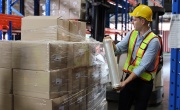Unlocking the Circular Economy: Why Quality Recycling Must Take Priority
Dimitra Rappou, Executive Director of Sustainable Products at the Confederation of Paper Industries, on prioritising high-quality recyclate in the UK's recycling system to achieve circular economy goals
 The new Labour Government has placed a circular economy at the heart of its environmental mission. This is positive news that will help ensure the UK can maximise the value of its materials and position itself as a leader in sustainable resource management.
The new Labour Government has placed a circular economy at the heart of its environmental mission. This is positive news that will help ensure the UK can maximise the value of its materials and position itself as a leader in sustainable resource management.
And yet, current Simpler Recycling proposals inherited from the previous administration have a critical missing piece that needs to be addressed to keep us on track towards our shared environmental ambitions across Government and industry. This missing piece is the high quality of recyclate. This is something the Confederation of Paper Industries (CPI) has consistently called for, along with many other united industry voices.
Ultimately, the quality of recyclate is paramount to creating a successful circular economy. High-quality recyclate enhances market demand, both domestically and internationally, and reduces reliance on virgin resources. This shift can help the UK meet its environmental goals, cut greenhouse gas emissions, and support long-term economic growth.
Although commingled recycling has been widely adopted in the UK due to its perceived convenience, the negative impacts of this system are becoming increasingly difficult to ignore. In the vast majority of cases, commingled collections significantly increase contamination rates, reducing the quality of paper and board collected for recycling. In fact, Government data underscores this issue, revealing that contamination rates for paper and card in commingled systems can spike to 15.5 per cent and 12 per cent, respectively. In contrast, where separate collections are employed, contamination plummets to 1.1 per cent and 4 per cent. This stark difference highlights the importance of improving collection methods to safeguard the quality of recyclable materials.
High contamination rates translate into very real economic and environmental costs. When recyclables are contaminated, they lose value. This undermines the very purpose of recycling and the Government's environmental objectives - to conserve resources and reduce waste. Poor-quality recyclate also threatens the success of British businesses and jobs. The growth and operation of the UK Paper Industry rely on high-quality materials to remain competitive and sustainable.
Countries like Wales have already demonstrated how high-quality recyclate can be achieved. They have implemented a successful separate collections regime, achieving some of the highest recycling rates in Europe. This success story shows that with the right policies and investments, the UK can significantly enhance its recycling system, positioning itself as a global leader in sustainable resource management.
To support this evolution, CPI has called on the Government to implement systems that prioritise quality, such as source-separated collection systems for paper and board. Doing so would not only ensure better-quality recyclate, but also attract investment into the UK's paper manufacturing sector by ensuring a reliable supply of high-quality materials.
Improving quality would also enhance the marketability of UK-produced recyclate, both domestically and internationally. This shift would support the UK's ambitions to build a resilient circular economy, reduce the demand for virgin resources, and cut greenhouse gas emissions.
The Government must take decisive action now by setting clear standards for recyclate quality, and providing the necessary support to make this transformation a reality. By doing so, the UK can pave the way for a recycling system that supports the paper industry, attracts investment, and helps achieve the nation's environmental goals.
So, it's time we see real change, and we urge the Government to seize this opportunity to get Simpler Recycling proposals right. We look forward to working in collaboration with Defra, wider industry, and local authorities to build a truly world-class recycling system.






